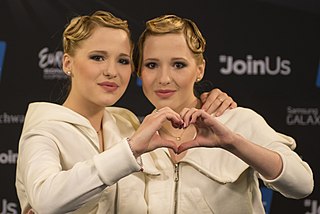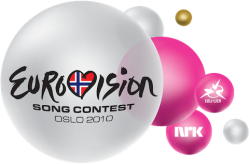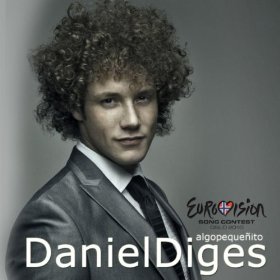Related Research Articles
The Eurovision Song Contest, often known simply as Eurovision, is an international song competition organised annually by the European Broadcasting Union. Each participating country submits an original song to be performed live and transmitted to national broadcasters via the Eurovision and Euroradio networks, with competing countries then casting votes for the other countries' songs to determine a winner.

The Junior Eurovision Song Contest is an international song competition which has been organised by the European Broadcasting Union (EBU) annually since 2003.

Belarus participated in the Eurovision Song Contest 16 times, making its debut in 2004 and having its last appearance in 2019. The country has been unable to participate in future contests following the European Broadcasting Union's (EBU) suspension of broadcaster BTRC from the EBU, which became effective in June 2021. The country's first appearance in a final was in 2007, with the song "Work Your Magic" performed by Dmitry Koldun, where it placed sixth; this remains Belarus' only top ten placement. Belarus also qualified for the final in 2010, 2013, 2014, 2017 and 2019. More recently, the nation had planned to take part in the canceled 2020 contest and was disqualified from taking part in the 2021 contest.

Romania has participated in the Eurovision Song Contest 23 times since its debut in 1994, and has placed in the top ten six times. Its best results were achieved by Luminița Anghel and Sistem in 2005, and by Paula Seling and Ovi in 2010, who both finished in third place. Selecția Națională, a song contest that has been taking place every year in Romania except for 2021, has been used to select the country's entry for the Eurovision Song Contest.

Albania has participated in the Eurovision Song Contest 20 times since its debut in 2004. Festivali i Këngës, a long-standing song contest that takes place every year in Albania since 1962, is used to select the country's entrant for that year's Eurovision Song Contest. Albania participated in the Eurovision Song Contest for the first time in 2004 with Anjeza Shahini placing seventh. It remained the country's highest result in the contest until 2012, when Rona Nishliu finished fifth.

Niamh Kavanagh is an Irish singer who sang the winning entry at the Eurovision Song Contest 1993.

Austria has participated in the Eurovision Song Contest 56 times since its debut in 1957. The country has won twice, in 1966 and 2014, and such it holds the record for the longest gap between consecutive wins — 48 years. The contest is broadcast in Austria by ORF. Vienna was the host city on both of the occasions that the contest was held in Austria, in 1967 and 2015.

"J'aime la vie" is a song recorded by Belgian singer Sandra Kim, with music composed by Jean Paul Furnémont and Angelo Crisci, and lyrics by Marino Atria. It represented Belgium in the Eurovision Song Contest 1986, held in Bergen, winning the contest. It is the only song from Belgium to win the contest, and Kim is the youngest ever Eurovision winner.

Daniel Gabriel Alessandro Saucedo Grzechowski, known professionally as Danny Saucedo or simply Danny, is a Swedish singer and songwriter. He rose to fame as one of the finalists in Idol 2006, the Swedish version of Idol, where he reached the top six.

Anastasiya Andreyevna Tolmacheva and Maria Andreyevna Tolmacheva, known as the Tolmachevy Sisters, are identical twin singers and actresses from Kursk, Russia. Aged nine, they won the Junior Eurovision Song Contest 2006 with their song "Vesenniy jazz". Eight years later, they represented Russia in the Eurovision Song Contest 2014, placing seventh with the song "Shine". The sisters released an album titled Polovinki in 2007.
Greece participated in the Eurovision Song Contest 2009 with the song "This Is Our Night" written by Dimitris Kontopoulos, Craig Porteils and Cameron Giles-Webb and performed by Sakis Rouvas. To select their entry for the 2009 contest, which was held in Moscow, Russia, the Greek national broadcaster Hellenic Broadcasting Corporation (ERT) internally selected Rouvas, while his song was chosen through the televised national final Ellinikós Telikós 2009, which consisted of three candidate songs voted upon by the public and a jury.
The Marcel Bezençon Awards were first handed out during the Eurovision Song Contest 2002 in Tallinn, Estonia honouring the best competing songs in the final. Founded by Christer Björkman and Richard Herrey, the awards are named after the creator of the annual competition, Marcel Bezençon.

The Eurovision Song Contest 2010 was the 55th edition of the Eurovision Song Contest. It took place in Oslo, Norway, following the country's victory at the 2009 contest with the song "Fairytale" by Alexander Rybak. Organised by the European Broadcasting Union (EBU) and host broadcaster Norsk rikskringkasting (NRK), the contest was held at the Telenor Arena, and consisted of two semi-finals on 25 and 27 May, and a final on 29 May 2010, tying with the 1999 edition for the contest hosted the latest. The three live shows were presented by Norwegian television presenters Erik Solbakken and Nadia Hasnaoui and singer Haddy N'jie.

"Algo pequeñito" is a song recorded by Spanish singer Daniel Diges, written by Jesús Cañadilla, Luis Miguel de la Varga, Alberto Jodar, and Diges himself. It represented Spain in the Eurovision Song Contest 2010, held in Oslo.

Safura Alizadeh Aliyev is an Azerbaijani pop singer. In 2009, she became the winner of the national contest "Pop Idol". In 2010, Safura took part in the Eurovision Song Contest, where she brought Azerbaijan on 5th place in the final, with the song Drip Drop, where she only was 17 years old. With Drip Drop, she reached the sales charts in Germany, Austria, Sweden, Norway, Belgium and Turkey.
Belgium participated in the Eurovision Song Contest 2011 with the song "With Love Baby" written by RoxorLoops and Benoît Giaux. The song was performed by the group Witloof Bay. The Belgian entry for the 2011 contest in Düsseldorf, Germany was selected through the national final Eurovision 2011: Qui? A vous de choisir!, organised by the Walloon broadcaster Radio Télévision Belge de la Communauté Française (RTBF). The competition featured thirty competing entries and consisted of two shows. In the final on 30 January 2011, "With Love Baby" performed by Witloof Bay was selected as the winner via the votes of a four-member jury panel and a public televote.
Romania participated in the Eurovision Song Contest 2012 with the song "Zaleilah" written by Elena Ionescu, Costi Ioniță and Omar Secada. The song was performed by the band Mandinga. The Romanian broadcaster Televiziunea Română (TVR) organised the national final Selecția Națională 2012 in order to select the Romanian entry for the 2012 contest in Baku, Azerbaijan. Fifteen entries were selected to compete in the national final on 10 March 2012 where "Zaleilah" performed by Mandinga was selected as the winner after scoring top marks from a nine-member jury panel and a public televote.
Fredrik "Benke" Rydman is one of the members from Bounce Streetdance Company. He was also a judge on the first season of So You Think You Can Dance Scandinavia.
Israel participated in the Eurovision Song Contest 2000 with the song "Sameach" written by Roy Arad and Guy Assif. The song was performed by the group PingPong, which was internally selected by the Israeli broadcaster Israel Broadcasting Authority (IBA) to compete at the 2000 contest in Stockholm, Sweden. PingPong and "Sameach" was announced by IBA as the Israeli entry on 6 January 2000.
Russia participated in the Eurovision Song Contest 2016 with the song "You Are the Only One" written by Philipp Kirkorov, Dimitris Kontopoulos, John Ballard and Ralph Charlie. The song was performed by Sergey Lazarev who was internally selected by the Russian broadcaster All-Russia State Television and Radio Broadcasting Company (VGTRK) to compete at the 2016 contest in Stockholm, Sweden. Lazarev's appointment as the Russian representative was announced on 10 December 2015, while the song, "You Are the Only One", was presented to the public on 5 March 2016.
References
- ↑ "Jennie Widegren visar hur du energiboostar!". cosmopolitan.se. 6 May 2009. Archived from the original on 31 August 2010. Retrieved 19 May 2010.
- ↑ Rosén, Maria. "Mellanakt i Eurovision Song Contest 2013 blir en hyllning till musiken". Sveriges Television. Archived from the original on April 25, 2013. Retrieved May 9, 2013.